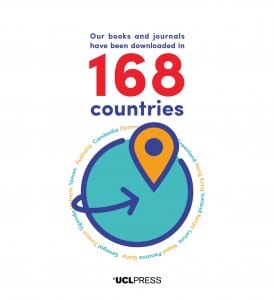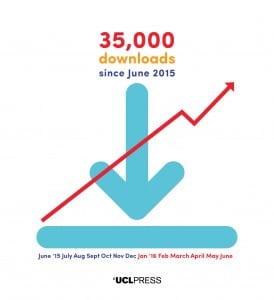UCL Press – One Year, and 35,000 Readers On
By ucyllsp, on 13 June 2016
 As we celebrate our first year of publishing, it is apposite to pause for a moment and look back at all that has happened, before we launch into busy and exciting plans for the future. Most pleasing is the wide readership our books are reaching – in one year, our books and journals have reached a combined total of over 35,000 readers in over 160 countries round the world. That’s an average of nearly 3,000 downloads per book. In an age when many scholarly monograph publishers report sales figures of around 400 copies in print, it’s a really encouraging response.
As we celebrate our first year of publishing, it is apposite to pause for a moment and look back at all that has happened, before we launch into busy and exciting plans for the future. Most pleasing is the wide readership our books are reaching – in one year, our books and journals have reached a combined total of over 35,000 readers in over 160 countries round the world. That’s an average of nearly 3,000 downloads per book. In an age when many scholarly monograph publishers report sales figures of around 400 copies in print, it’s a really encouraging response.
Our open access model is proving to be very popular with authors too and we have had well over 150 book and journal proposals. Since we launched in June 2015 as the UK’s first fully open access university press, it has also been interesting to see the publishing landscape changing and more new university presses spring up, many of them also open access, including Westminster University Press, White Rose University Press and Cardiff University Press. Goldsmiths also launched its new press recently with a mission of publishing innovative and less constrained academic works.
We have published 14 books and 3 journals so far in a wide range of subjects including archaeology, anthropology, Jewish studies, urban studies and history, and
 the forward programme is building up quickly. In 2017 we are on course to publish 35 books and several more journals. Later this year and next year we look forward to publishing our first textbooks, on plastic surgery and public archaeology. We are publishing our first popular science book called Why Icebergs Float (Andrew Morris), a book that examines urban food production as a potential solution to the global food crisis (Sustainable Food Systems by Robert Biel), and our first BOOC (Books as Open Online Content), an innovative digital format that will launch with the outputs of the Academic Book of the Future project, an AHRC/British Library project led by academics at UCL and Kings College London investigating how scholarly publishing will look in years to come.
the forward programme is building up quickly. In 2017 we are on course to publish 35 books and several more journals. Later this year and next year we look forward to publishing our first textbooks, on plastic surgery and public archaeology. We are publishing our first popular science book called Why Icebergs Float (Andrew Morris), a book that examines urban food production as a potential solution to the global food crisis (Sustainable Food Systems by Robert Biel), and our first BOOC (Books as Open Online Content), an innovative digital format that will launch with the outputs of the Academic Book of the Future project, an AHRC/British Library project led by academics at UCL and Kings College London investigating how scholarly publishing will look in years to come.
Here are a few key facts about our publishing since we started publishing in June 2015:
- Our books have been downloaded over *35,000 times (that’s an average of 2,916 times each)
- Our books have been downloaded in over 160 countries round the world, from Albania to Zimbabwe
- Our most downloaded book is How the World Changed Social Media by Danny Miller et al, which was downloaded over 10,000 times between 1 March and 1 June 2016
- Our books have been reviewed in THE, The Economist, The Atlantic’s CityLab, BBC World Service, BBC Today programme, LSE Review of Books and Wired, amongst others
- This month sees the launch of our new interactive digital platform that offers scholars new ways of publishing their research in non-traditional formats
 There is a lot to celebrate, but most important of all is our authors and journal editors. We feel incredibly honoured that so many talented academics from UCL and beyond have chosen to publish with us, a new press with an alternative business model, and we look forward to working with them on more exciting projects in the coming years. And indeed, it is our business model that is driving our authors to choose UCL Press. As demonstrated in the figures above, open access means that books and journals are read and distributed globally in significant numbers. And what could be more important for scholarship?
There is a lot to celebrate, but most important of all is our authors and journal editors. We feel incredibly honoured that so many talented academics from UCL and beyond have chosen to publish with us, a new press with an alternative business model, and we look forward to working with them on more exciting projects in the coming years. And indeed, it is our business model that is driving our authors to choose UCL Press. As demonstrated in the figures above, open access means that books and journals are read and distributed globally in significant numbers. And what could be more important for scholarship?
In the words of Daniel Coit Gilman, founder of Johns Hopkins University Press:
It is one of the noblest duties of a university to advance knowledge and to diffuse it not merely among those who can attend the daily lectures but far and wide.
Posted on behalf of Lara Speicher, Publishing Manager, UCL Press
*At 1 June 2016
 Close
Close


 Jewish Historical Studies: Transactions of the Jewish Historical Society of England is now jointly published with UCL Press. Why is this such excellent news and of historical significance in itself?
Jewish Historical Studies: Transactions of the Jewish Historical Society of England is now jointly published with UCL Press. Why is this such excellent news and of historical significance in itself?